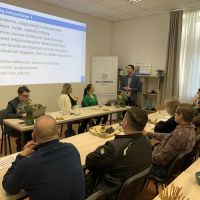B-solutions promotion event
Legal accessibility + Project development | 07 February 2023
Legal accessibility + Project development | 07 February 2023
AEBR and CESCI jointly organised a workshop on 1st February 2023, in order to present the latest calls for proposals of the b-solutions project. First, Cinzia Dellagiacoma, the Project and Communication Manager of AEBR, welcomed the guests and provided an overview (presentation is available here) of the b-solutions project.
B-solutions is a pilot initiative aiming to tackle legal and administrative obstacles along EU internal land borders. The initiative is supported by the European Commission’s Directorate-General for Regional and Urban Policy (DG REGIO) and managed by the Association of European Border Regions (AEBR).
The main goal of b-solutions is to provide solutions for legal and administrative obstacles hindering cross-border cooperation. To this end, municipalities and regions along the border, together with cross-border organisations, provide information on the legal and administrative obstacles they come across during their cross-border activities. Provided that the research needs of the reported obstacles are in line with the project objectives, successful applicants will receive a support from the European Commission to put these barriers under scrutiny and elaborate solutions to overcome them.
Four calls for proposals were launched within the framework of b-solutions between 2018 and 2021, which involved practitioners and policymakers identifying obstacles complicating cross-border cooperation, as well as finding potential solutions for these issues. A total of 90 cases were collected and reviewed in various thematic fields (cross-border public services, climate change, institutional cooperation, labour market and education). Identifying and eliminating these obstacles offer a great opportunity to build capacities to manage legal and administrative barriers, to promote the exchange of information between practitioners of cross-border cooperation, and to raise public awareness about the challenges and innovative solutions of the border regions.
In January 2022, AEBR launched the b-solutions 2.0 project, which focuses on public entities and cross-border organisations located along EU internal land and maritime borders as well as along EU borders with EFTA (Iceland, Liechtenstein, Norway and Switzerland) and IPA countries (Turkey, Albania, Montenegro, Serbia, the Republic of North Macedonia and Bosnia-Herzegovina). The project aims to promote sustainable solutions to legal and/or administrative obstacles hindering cross-border cooperations in the border regions.
There have been two open calls for proposals between 2022 and 2023, with the latest being open until 28 February 2023.
The b-solutions projects are implemented with the collaboration of experts with specific professional (legal, advisory) and language skills. The experts can apply for an expert status through a call for expression of interest, and they are selected on the basis of pre-defined criteria.
The experts are then contractually involved in exploring the obstacles (for e.g. on-site consultation with project developers, elaborating potential solutions, collecting legal regulations affected by the obstacle, and outlining an implementation proposal). One of the innovations of the b-solutions 2.0 project is that the identified problems are not only addressed by legal experts, but also by all the participants through workshops. The experts’ researching efforts are expected to bring about the development of realistic and innovative proposals for solutions to EU and national authorities.
Later, the speaker briefly presented the previous, successfully implemented Hungarian b-solutions projects (the organisations involved in the project were: Gate to Europe EGTC, Mura Region EGTC, Ister-Granum EGTC, Arrabona EGTC, Pannon EGTC).
Afterwards, Gyula Ocskay, Secretary General of CESCI, presented the Legal accessibility and B-solutions projects managed by CESCI (his presenation is available here). He also introduced the stakeholder organisations and their representatives who were present at the event. The introduction of the representatives was followed by an exchange of experiences regarding the barriers they had experienced. Lastly, the AEBR representative received questions about the b-solutions 2.0 project.
Finally, CESCI invited the participants to a sandwich lunch.

 Via Carpatia development workshop
Via Carpatia development workshop